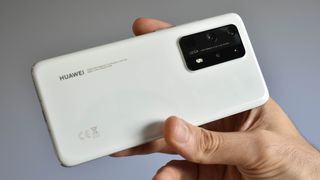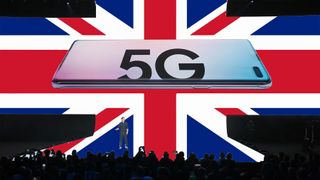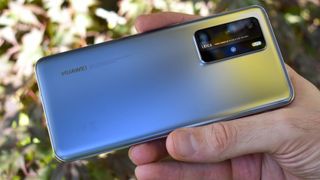What Huawei's 5G UK network ban means for you
Will 5G be further away now?

As the world slowly builds up its 5G infrastructure, and looks forward to faster mobile connectivity than ever before, Britain has made a curious decision: it has decided to switch some of the 5G equipment off again.
Why? Because some of what has already been deployed is made by Chinese tech giant Huawei, and the government has concluded that it doesn’t want the company anywhere near our 5G network.
So what does this mean for you and your shiny new 5G phone? Is the future finally here, or will it still be buffering for some time? Should you now wait to buy a 5G device? Read on to find out.
What has the UK government decided?
If this controversy is giving you a sense of deja-vu, then you’re not alone. Way back in April 2019, the then UK Prime Minister, Theresa May, decided that the phone networks would be allowed to use gear made by Huawei in the non-critical parts of their infrastructure.
Think of all the transmitters, routers and other technical gubbins that actually help the internet reach our phones. This isn't specifically about Huawei mobile phones that you've seen on shop shelves.
But April 2019 was a different time, it turns out. Not just because back then we could hug each other without becoming social pariahs, but because this week, the current Prime Minister, Boris Johnson, has decided exactly the opposite. He has said No Way, Huawei.
So now all of the existing Huawei gear will need to be removed by 2027, and any planned future infrastructure will need to be built using equipment from firms such as Nokia and Ericsson instead.
Get daily insight, inspiration and deals in your inbox
Get the hottest deals available in your inbox plus news, reviews, opinion, analysis and more from the TechRadar team.
What will happen to Britain's 5G network?

It remains unclear exactly how much this will impact the roll-out of 5G in Britain, though it seems almost certain to slow it down. Instead of simply throwing up new transmitters and the like, O2, EE, Vodafone and Three are going to have to spend time changing over existing equipment instead.
According to Mobile UK, a mobile industry lobby group supported by the four major networks, it could delay the completion of the 5G rollout by anything from 18 to 24 months. But not everyone is so pessimistic.
“The timing has been selected to limit any potential disruptions to the existing system related to stripping out Huawei components,” says John Bryson, Professor of Enterprise and Economic Geography at the University of Birmingham.
The other complication - and slightly awkward thing - is that when it comes to 5G equipment, Huawei is the market leader, and is widely regarded as producing the best, most cost-effective equipment in the world.
So not only will the networks have to source alternatives, but they may have to pay more for the privilege too. Whether any increased costs will be passed on to the consumer remains to be seen.
Why did the government make this decision?
Depending on how cynical you are, there are two answers. The first answer, which you’re likely to hear from politicians defending the decision, is that it was a decision driven by national security concerns. The 5G network is going to be critical national infrastructure, just like our electricity network or our North Sea gas. And so it is probably unwise to have a company headquartered in a potential major adversary - China - involved in the running of that infrastructure.
For example, it’s easy to imagine how in a cyberwar situation, China may insist that Huawei insert a backdoor into its equipment, so that it can snoop on the UK's data. How do we know China might do that? It turns out that the United States did the same thing. As Edward Snowden exposed, the American National Security Agency (NSA) compelled all of the major US tech firms to build back doors into their products.
To be clear, there is no evidence that any Huawei’s 5G equipment or devices have been used for this sort of purpose in the past. But ultimately, even if Huawei is a company that is independent of the government, just as the President of the United States can lean on Facebook and Google, Xi Jinping can lean on Huawei if he wants to.
So one level, it is a completely reasonable thing to worry about. Though not everyone finds it a convincing argument. “Huawei is more heavily scrutinised (at their own expense) than any other tech company in the world,” says Professor Madeline Carr, who is Director of the Research Institute in Socio-technical Cyber Security at UCL.
“I would suggest that we would be much better off if we exercised the same level of scrutiny on Google, Amazon, Facebook etc as well.”
The second, more cynical level on which to understand the decision, is that this decision is a direct reaction to Donald Trump’s aggressive posturing with China. Since he took office in 2017, he has been engaged in a trade war, and last year went as far to impose sanctions that banned Huawei from using chips from western vendors in their phones, and Google’s services in the version of Android that runs on them.
More recently, and crucially since Theresa May made the original decision, Trump has threatened to cut countries that use Huawei gear from intelligence sharing agreements with the United States. So if the UK's spooks want to maintain their access to one of our closest allies, then really they had no choice.
And on top of this is also the more practical reason that US sanctions on Huawei could make it hard for British firms to actually get hold of Huawei equipment and then maintain it.
And hey, if the security concerns are justified, then at least the decision conceivably makes it slightly harder for the Chinese government to read your no-doubt thrilling WhatsApp messages.
What does Huawei say?
So what does Huawei say on the topic? Edward Brewster, spokesperson for Huawei UK, said, "This disappointing decision is bad news for anyone in the UK with a mobile phone. It threatens to move Britain into the digital slow lane, push up bills and deepen the digital divide. Instead of ‘levelling up’ the government is levelling down and we urge them to reconsider.
"We remain confident that the new US restrictions would not have affected the resilience or security of the products we supply to the UK. Regrettably our future in the UK has become politicized, this is about US trade policy and not security."
The company has also said it will be starting a detailed review into the impact of the UK government's decision, and the company will keep trying to work with the UK government in the future. Exactly what will come from that is currently unclear.
Hang on… isn’t Huawei gear used for 4G and wired internet anyway?
This is the amusing thing that isn’t often talked about! As well as being at the forefront of the 5G rollout, Huawei’s network infrastructure has for many years now been a core part of the 2G, 3G and 4G networks in Britain - and even a lot of fixed line broadband infrastructure too. So chances are that this very article passed through some Huawei equipment on its way from TechRadar’s servers to the device you’re reading this on right now.
Crucially though, as things currently stand, this week’s decision only affects 5G, and the government has said there is no need for mobile firms to replace older generations of equipment.
Amusingly too, until 2018 Huawei kit was even used in a special 4G network for the emergency services, including the police. But BT has since phased this out citing similar security concerns.
So Huawei on 4G is good and Huawei on 5G is bad? As silly as this sounds, arguably there is an important difference: When 5G reaches its full potential, it won’t just be doing everything we do with 4G now, it’ll be even more critical. It will be the backbone of everything from autonomous vehicles to smart electric grids and other critical infrastructure that could have real life or death consequences.
Or maybe the government has just realised that going back and retrofitting all of the 4G infrastructure as well would be even more of an expensive nightmare?
Will my new 5G Huawei phone still work?

If you have recently picked up a Huawei P40 Pro or rely on a P30 Lite then worry not - your phone will still work just fine. The ruling only applies to technical infrastructure. Phew!
That’s a relief. So just tell me: Was the decision the right thing to do?
Ultimately, the decision is a difficult trade-off. On the one hand, the ban will likely limit the 5G roll out in a very real way. And that could have broader economic implications too. According to lobby group Mobile UK, it could cost the British economy somewhere between £4.5bn and £6.8bn. It will cost Britain in terms of productivity and competitiveness at a time when the economy is already under pressure from Covid-19 and Brexit.
But if you buy the national security argument for freezing Huawei out of the 5G network, and are concerned about China’s increasing assertiveness on the international stage and in cyberspace, then… how can you put a price on that? You might consider it a price worth paying.
And who knows, maybe it could also pay off in the long run, as moves by the west to limit Huawei’s dominance may lead to a willingness to support the scientists so that the next generation of mobile connectivity is pioneered in the democratic world.
“I don't foresee any major issues with the 5G roll-out as a delay of a few months is not important," says professor Bryson. "The key will be 6G and 7G and where and by whom this technology is developed."
So is it better to lock down and protect the UK's infrastructure, or to open it up a little to get access to the better technology more quickly and for less money? The frustrating answer is that there are no easy answers. But at least your phone will still work.
Most Popular

